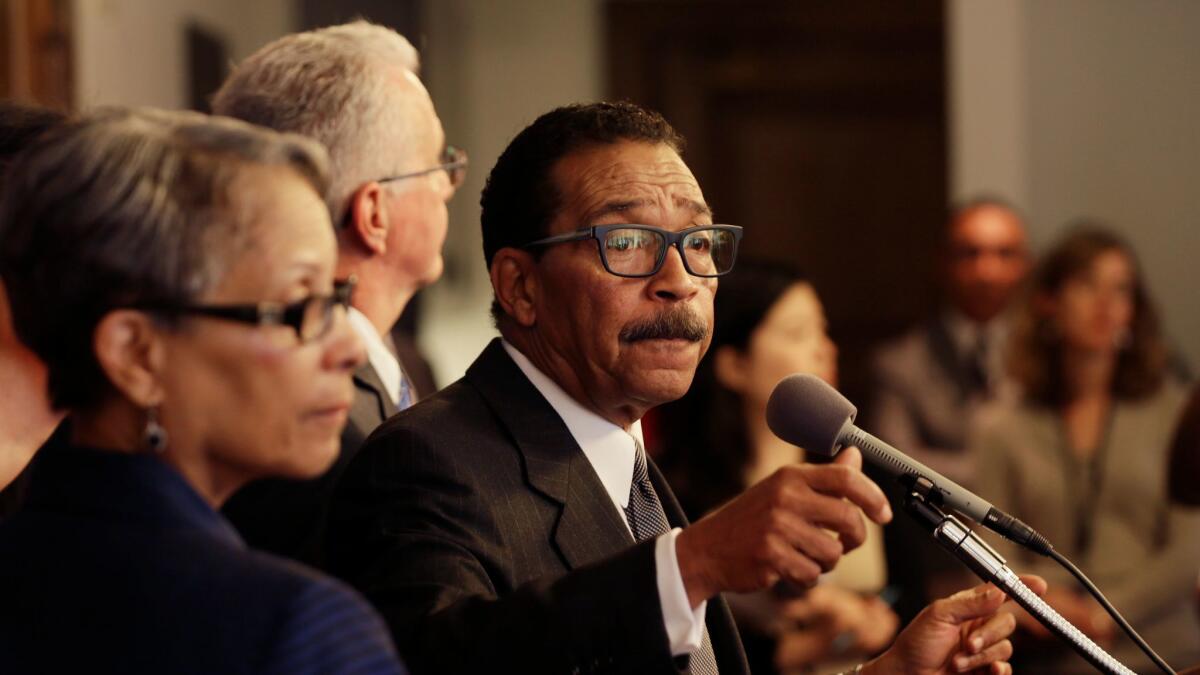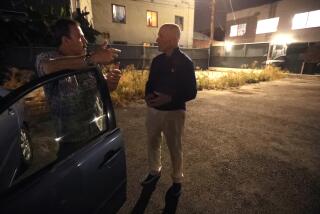One of L.A.’s most powerful politicians is searching for his homeless son — cameras in tow
- Share via
It’s a campaign video with the pathos of a Hallmark Channel movie.
A worried father walks the streets of skid row, carrying a picture of his son and buttonholing strangers to ask if they have seen him.
You can see the strain on the father’s face — and feel the joy as he skips down the middle of a street lined with tents, en route to a reunion with his homeless son.
This kind of scenario plays out privately for countless local families, in a county where nearly 60,000 people are homeless, most of them living on the streets.
But this worried father is one of Los Angeles’ most powerful politicians: City Council President Herb Wesson, the former speaker of the California Assembly. The son he is searching for is 50-year-old Doug.
Wesson, the candidate, hopes the carefully crafted campaign video will help propel him to an open seat on the L.A. County Board of Supervisors in March. He is already known as a consummate politician. The 90-second ad recasts Wesson as a resolute dad, relentlessly trying to reclaim a troubled son.

The video, narrated by his wife, aims to let us know that he’s intimately familiar with a plight that’s afflicted many families in the 2nd Supervisorial District in South Los Angeles that he’s running to represent. That he understands the woes and pain of wayward children, mental illness, addiction and grief.
It’s a smart move in an election cycle in which homelessness is the county’s most volatile and pressing issue. His experience means he’s got skin in the game.
But the cynic in me is a bit bothered by the idea of staging a skid row search with cameras in tow. When does being transparent about one’s life experiences cross over into trying to manipulate voters?
Doug’s troubles began when he was in his early 20s, with a bipolar diagnosis and intractable depression. He began “self medicating,” Wesson told me. Brief periods of stability were bracketed by long disappearances.
Wesson spent a lot of time searching skid row over the years. “When I went there at first, I was afraid,” he said. “But I’m not afraid anymore.” He became familiar to skid row residents, who might not tell him where his son was staying but would arrange for them to meet.
“I had about a 35% success rate in finding him,” Wesson, 68, told me. “It’s hard to describe, but there’s a community there, and they take care of themselves.”
For decades, he only shared his son’s troubles with a small group of friends and family. “At one point, I wanted to act like it didn’t happen, like he did not exist,” Wesson admitted. But as the homelessness crisis grew in Los Angeles, he spent more time talking with residents who’d lost loved ones to the streets.
“You hear their stories and you want to share, you want to relate,” he said. “But you can’t if you’re keeping a secret.”
A few years ago, Doug’s medical treatment and family support finally seemed to kick in. “He was doing well,” Wesson said. “He had a little apartment with a roommate. He had a girlfriend. We had weddings, family events, a birthday party for my wife. I thought this was it; he had turned the corner.”
That led Wesson to think about sharing his family’s story. His son had been sober and stable for almost two years. Then Doug relapsed and vanished into the streets. “We didn’t see him again for about seven weeks,” Wesson said. And the skid row treks were back on the calendar again.
“When this happens to the family,” he said, “you go through a roller coaster of emotions.
“First you’re mad. ‘How could you do this to us? I coached your football team! Your mother did the PTA!’ Then comes, ‘Oh, my God, how is he surviving? Has he eaten? It’s freezing out there.’ Then it’s, ‘What else could I have done? Should I have been more of a disciplinarian?’
“And through it all, he’s embarrassed, we’re embarrassed,” Wesson said. “Nobody thinks when they’re raising a child, that they’re going to wind up on skid row.”
**
Wesson is running for the Board of Supervisors seat that has been held for more than 10 years by Mark Ridley-Thomas, who is running to take over the 10th District seat on the City Council that Wesson has held for 14 years.

The Board of Supervisors race has been punctuated in recent weeks by scrutiny over rent breaks provided to one of Wesson’s other sons at an apartment building tied to a developer with a major project in his council district. He has denied any wrongdoing.
I wondered as I watched Wesson’s ad whether voters would see more than him being a good and loving dad — because the scenes of squalor and disorder also highlight what many see as his Achilles’ heel as council president: the failure to tackle the homelessness crisis with the urgency it deserves.
It’s a failure that is reflected at every level of government, and our leaders have to answer for that.
I put the question to Wesson: Whose responsibility is it to make sure people like Doug are safe, sheltered and provided with the help they need as they battle their demons?
“I think we all have to take responsibility,” he said. “I will climb up the highest mountain and say that I will take my share of the responsibility.”
He sees his campaign video as part of that process. “The more people know what it’s really like, the more people will be engaged in a commitment to really solve it,” he said.
What he’s experienced through his son’s struggles has equipped him to understand the problem of homelessness in ways he didn’t before, he said. He ticked off the lessons he’d learned.
1. Family members need to stop hiding. Addiction is an ongoing disease — something you have to deal with every day. Shame hinders healing.
2. You have to be ready when an addict is willing to accept help. And there aren’t enough mental health or addiction treatment programs to accommodate the need.
3. Homeless services are spotty and the process for connecting people to them is unwieldy. If the president of the City Council can’t find help for his son, with all the resources at his disposal, imagine how lost an ordinary person must feel.
4. The best experts may be on the streets, not in think tanks or government buildings. We need to listen to people with lived experience, and blend their views into whatever professionals recommend.
Being Doug’s dad “has changed my perspective significantly,” Wesson told me. “It’s a challenge to find what’s right for them … to streamline the process of recovery so we’re not losing people to the streets.”
It was a family decision to film Wesson’s skid row visits, he told me. They hoped that sharing their story could convince others to open up, even though it might also be seen as exploiting his son’s pain for political gain. “We needed to do something radical. What I wanted to do is personalize it, let people know what it’s like.”
For now — or at least when I spoke to Wesson — Doug is again lost to the streets. The reunion on the campaign video lasted for three days, Wesson said. Then Doug took off to see his girlfriend. “We were trying to get him into rehab, but he disappeared for several weeks.”
Then father and son reconnected the weekend before Thanksgiving.
“He was here on Saturday, then disappeared on Sunday,” his father said. “But I’ll find him again.”
More to Read
Sign up for Essential California
The most important California stories and recommendations in your inbox every morning.
You may occasionally receive promotional content from the Los Angeles Times.











